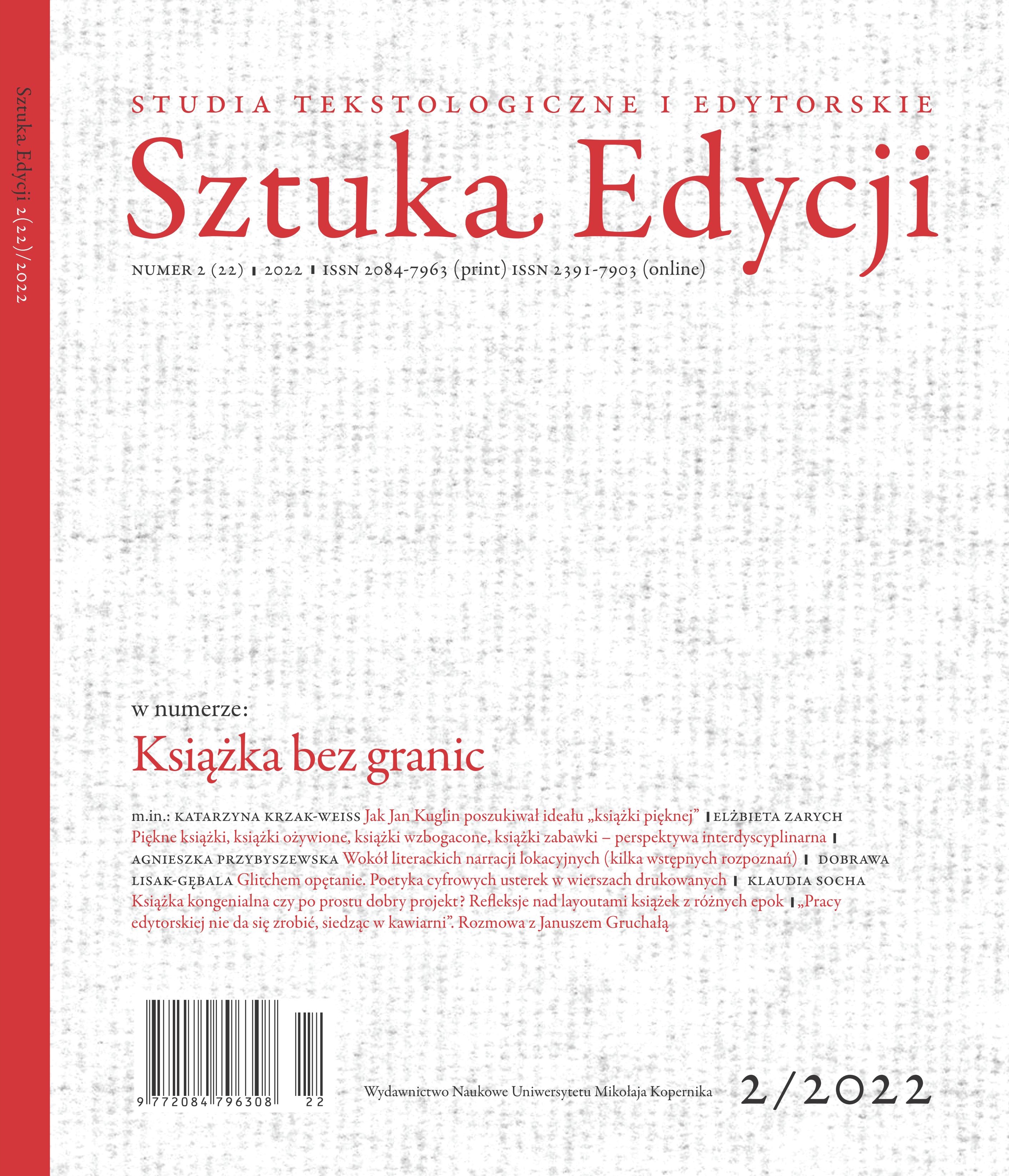Possessed by glitch. Poetics of digital errors in printed poems
DOI:
https://doi.org/10.12775/SE.2022.00028Keywords
21st-century Polish poetry, glitch poetry, glitch art, digital poetry, artistic book, posthumanism, Warsaw neolinguists, Rozdzielczość Chleba, Andrzej Sosnowski, Ewa Solska, Łukasz Podgórni, Leszek Onak, Piotr Puldzian Płucienniczak, Kamil Brewiński, Maria Cyranowicz, Jarosław Lipszyc, Roman MisiewiczAbstract
In the field of electronic media glitch is defined as a breach in the surface of one system that opens a brief insight into otherwise deeply hidden digital structures. An alien element visible on the screen due to unprovoked malfunctions in hardware’s or software’s operating is often interpreted from the vantage point of posthumanism. This perspective impacts the way digital failures, that are intentionally applied, function within the frame of glitch poetry – also when it is printed in paper editions which consequently involves the phenomenon of retrograde remediation. The vast majority of printed examples scrutinized in this paper consists of volumes by Warsaw neolinguists and publishing hub Rozdzielczość Chleba. In their manifestos the authors representing both groups diagnosed a radical shift in the paradigm of art creation towards new media. They highlighted the desired openness to collaboration in the process of text production with computers connected to the internet that flood their users with glitches, unsolicited e-mails and advertisements. Parallelly, these poets announced the downfall of printed books associated, according to the manifestos, with the postromantic model of the poem as a subjective monologue.
Analog glitch poetry, which goal is to reveal the conflict of two paradigms, often takes on the form of post-digital artistic books that feature dominant graphic effects stifling the verbal message and in so doing they offer samples of 21st-century esoteric abstractionism. Glitch poetry may also function as an allegedly traditional black text printed on a white sheet of paper, yet a one that combines human-readable words and phrases with anti-phonetic digital failures expressed in non-alphanumeric characters.
References
Ars combinatoria według Ewy Solskiej, 2018, https://poecipolscy.pl/aktualnosci/ars-combinatoria-wedlug-ewy-solskiej/ (dostęp: 11.05.2021).
Bazarnik K., Fajfer Z., 2003, (O)patrzenie, Kraków.
Bazarnik K., Fajfer Z., 2008, Co to jest liberatura?, Kraków.
Betancourt M., 2017, Glitch Art in Theory and Practice. Critical Failures and Post-Digital Aesthetics, New York–London.
Bodzioch-Bryła B., 2019, Sploty: przepływy, architek(s)tury, hybrydy. Polska e-poezja w dobie procesualności i konwergencji, Kraków.
Bolter J. D., 2014, Remediation, w: The John Hopkins Guide to Digital Media, pod red. M.-L. Ryan, L. Emerson, B. L. Robertson, Baltimore.
Braidotti R., 2014, Po człowieku, przeł. J. Bednarek, A. Kowalczyk, Warszawa.
Brewiński K., 2013, Clubbing, Kraków.
Cubitt S., Glitch, 2017, „Cultural Politics”, Vol. 13, No. 1.
Cyberżulerscy poeci, 2014, „Notes na 6 Tygodni”, nr 93.
Cyranowicz M., 2004, Piąty element to fiksja, Warszawa.
Gada !zabić?: Pa]n[tologia neolingwizmu, 2005, nawigacja: M. Cyranowicz i P. Kozioł, projekt graficzny M. Sobczyk, Warszawa.
Emerson L., 2014, Glitch Aesthetics, w: The John Hopkins Guide to Digital Media, pod red. M.-L. Ryan, L. Emerson, B. L. Robertson, Baltimore.
Felberg-Sendecka K., Neolingwizm, w: Polska poezja współczesna. Przewodnik encyklopedyczny, http://przewodnikpoetycki.amu.edu.pl/encyklopedia/neolingwizm/ (dostęp: 11.05.2021).
Jędrek G., 2013, Zmiana nośnika czy zmiana systemu? O dwóch manifestach, jednej rewolucji i cyberpoezji, „Fragile”, nr 2.
Jones N., 2017, Glitch Poetics: the Posthumanities of Error, w: The Bloomsbury Handbook of Electronic Literature, ed. J. Tabbi, London–New York–Bloomsbury.
Kobierski R., 2002, Voyeur (Syberiada), „Meble”, nr 6.
Manifest Neoligwistyczny v 1.1, 2005, w: Gada !zabić?: Pa]n[tologia neolingwizmu, nawigacja: M. Cyranowicz i P. Kozioł, projekt graficzny M. Sobczyk, Warszawa.
Manifest Rozdzielczości Chleba, „producenci: Leszek Onak, Łukasz Podgórni / Podpisują się: Roman Bromboszcz, Piotr Puldzian Płucienniczak, Tomasz Pułka”, https://rozdzielchleb.pl/manifest/ (dostęp: 11.05.2021).
Marecki P., 2018, Między kartką a ekranem. Cyfrowe eksperymenty z medium książki w Polsce, Kraków.
Menkman R., 2011, (The Glitch Moment(um), Amsterdam.
Nowakowski R., 2009, Traktat kartkograficzny, czyli rzecz o liBeraturze, http://www.liberatorium.com/books/traktat/traktat.html (dostęp: 11.05.2021).
Onak L., Podgórni Ł., 2012, wgraa, Kraków.
Pawlicka U., 2012, (Polska) poezja cybernetyczna. Konteksty i charakterystyka, Kraków.
Pawlicka U., 2015, Polska poezja i nowe media po roku 2000, w: Poezja polska po roku 2000. Diagnozy – problemy – interpretacje, pod red. T. Dalasińskiego, A. Szwagrzyk i P. Tańskiego, Toruń.
Pietrzak W., 2013, Poezja życia / poezja instrukcji: poems Anrzeja Sosnowskiego w kontekście teorii poezji Ezry Pounda, „Poznańskie Studia Polonistyczne”, nr 22 (42).
Pisarski M., 2016, Glitch-Lit. Odchodzenie od literatury człowieczej, w: Glitch art is dead, pod red. A. Pieńkosz, P. Puldziana Płucienniczaka, https://rozdzielchleb.pl/glitch-art-is-dead/ (dostęp: 11.05.2021).
Podgórni Ł., 2010, Noce i pętle, Kraków.
Przybyszewska A., 2015, Liberackość dzieła literackiego, Łódź.
Puldzian Płucienniczak P., 2012, marsz na Rom, internet 2012, https://issuu.com/rozdzielczosc-chleba/docs/ppp-marsz_na_rom, (dostęp: 11.05.2021).
Romana J.-M., 2019, I am Error. Glitch Poetry, CreateSpace Independent Publishing Platform.
Solska E., 2013, Misirlou, Warszawa.
Sosnowski A., 2010, poems, Wrocław.
Downloads
Published
How to Cite
Issue
Section
License
Copyright (c) 2022 Dobrawa Lisak-Gębala

This work is licensed under a Creative Commons Attribution-NoDerivatives 4.0 International License.
Stats
Number of views and downloads: 546
Number of citations: 0



